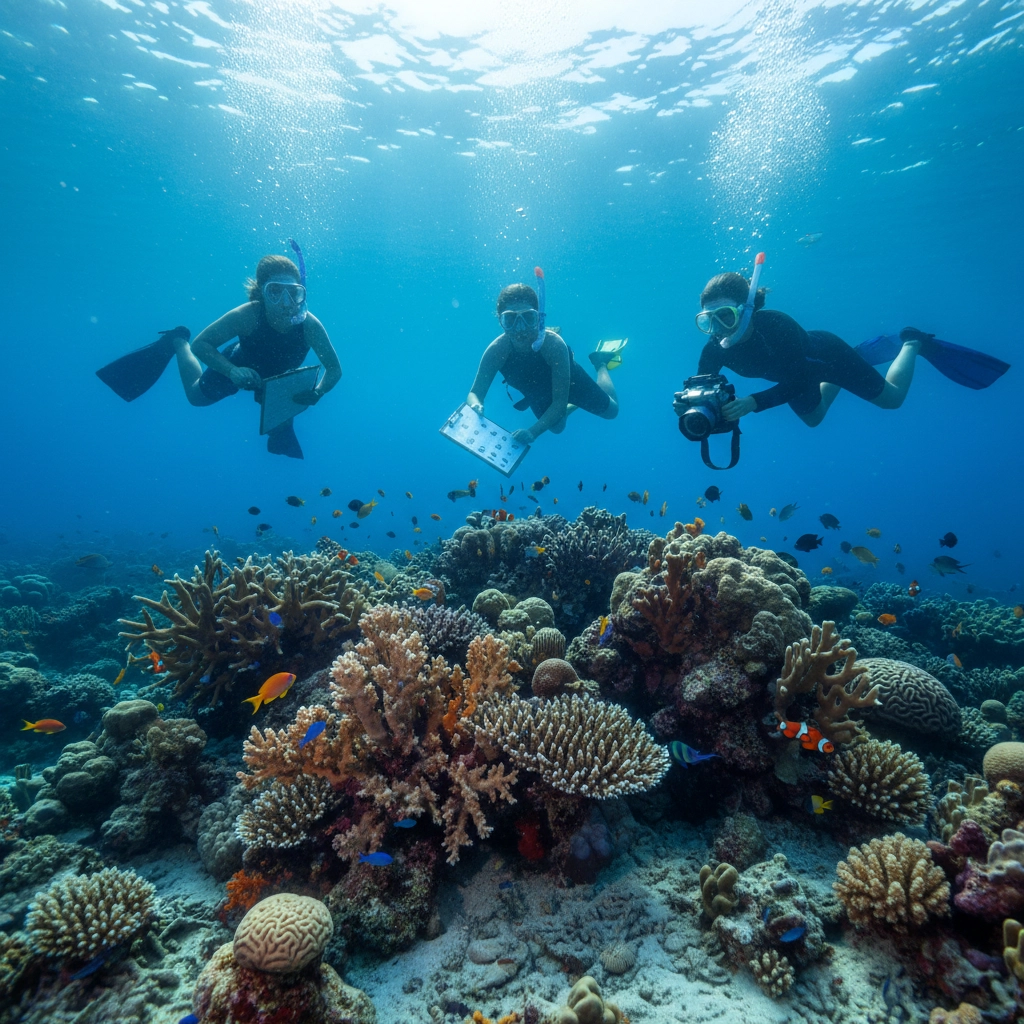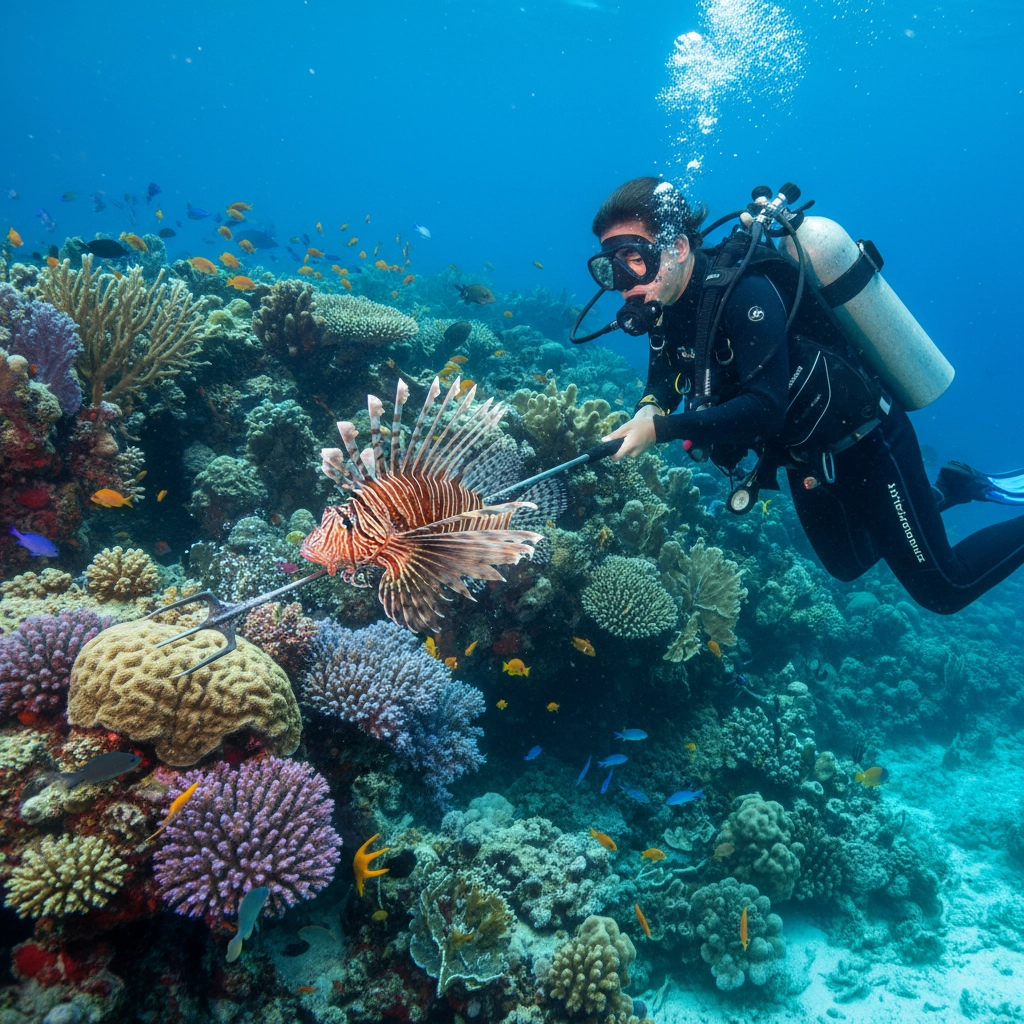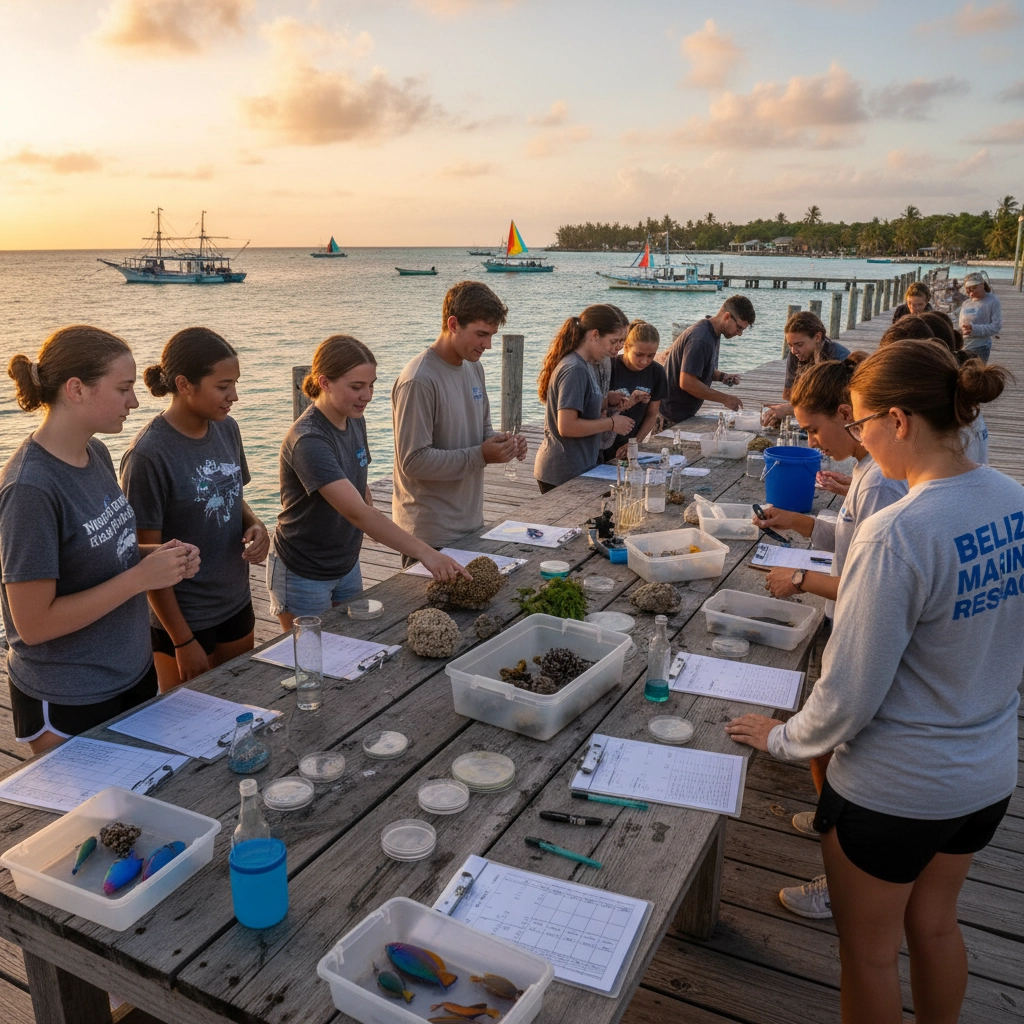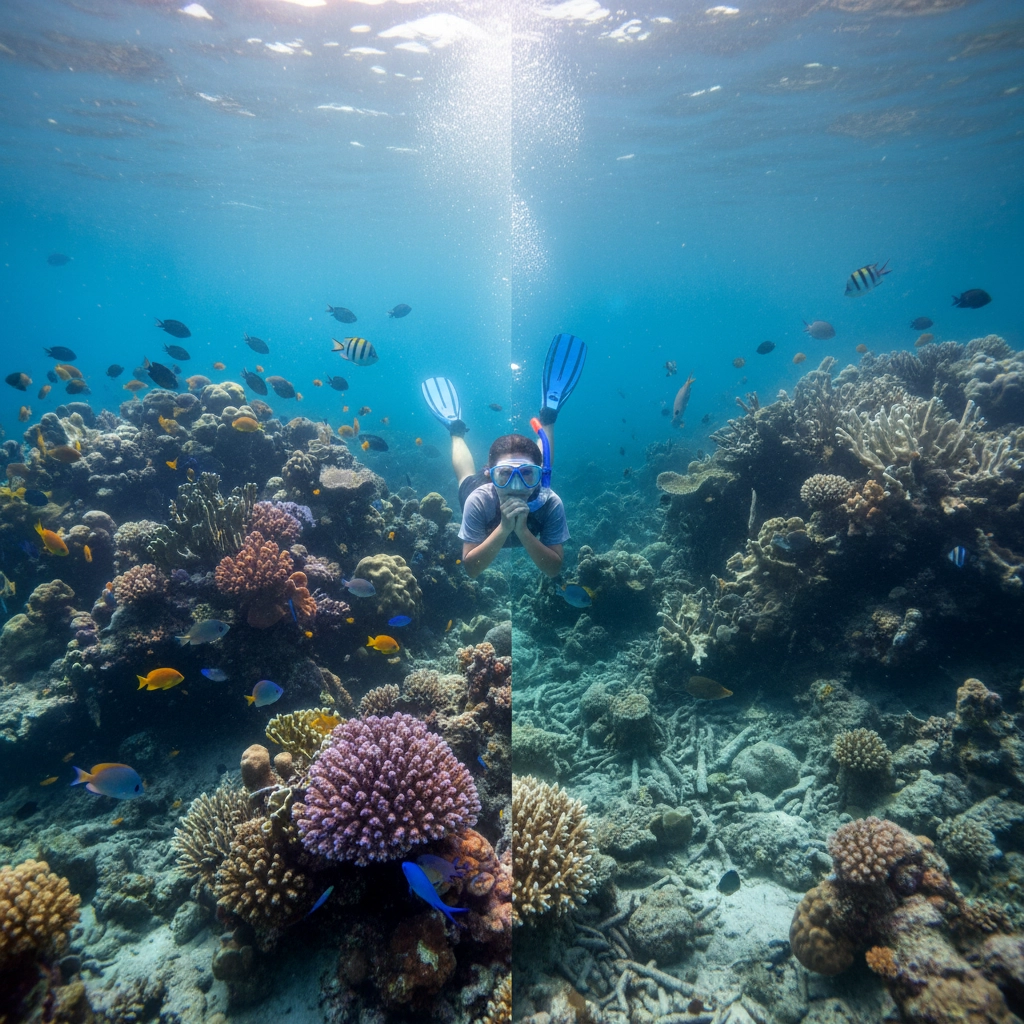How Student Trips to Belize Help Conserve Coral Reefs and Marine Life
- Caleb Mullenix
- Nov 11, 2025
- 5 min read
Understanding the direct impact of educational travel on marine conservation is essential for educators seeking meaningful science experiences for their students. Student expeditions to Belize represent far more than traditional field trips: they constitute active participation in critical conservation efforts that protect one of the world's most vital marine ecosystems. The Belize Barrier Reef Reserve System, a UNESCO World Heritage Site and the second-largest coral reef system globally, serves as both classroom and laboratory where students contribute measurable conservation outcomes while developing essential scientific competencies.
Ensuring that student travel experiences generate authentic conservation impact requires careful planning and partnership with established research organizations. Through structured programs that combine rigorous scientific methodology with hands-on fieldwork, students become active contributors to ongoing conservation efforts rather than passive observers of marine environments.
Direct Marine Research and Data Collection
Student participation in scientific data collection forms the foundation of conservation-focused educational expeditions to Belize. Engage students in systematic documentation of marine biodiversity, water quality parameters, and ecosystem health indicators that contribute directly to conservation databases used by local governments and international research organizations.
Begin marine research activities with comprehensive species identification training, focusing on critical reef inhabitants including elkhorn coral, brain coral, barrel sponges, and indicator fish species. Students learn to recognize and document these organisms using standardized survey protocols, ensuring their observations contribute to long-term monitoring datasets essential for reef management decisions.

Implement structured data collection procedures that transform student observations into actionable conservation information. Establish systematic recording methods for water temperature measurements, visibility assessments, and marine life population counts during snorkeling and diving activities. Create detailed field journals that combine quantitative data with scientific sketches, developing students' observational skills while generating valuable research documentation.
Coordinate data collection activities aboard research vessels where students work directly with marine biologists to document populations of sea turtles, dolphins, manatees, and coral reef fish communities. Emphasize the importance of precise measurement techniques and standardized observation protocols to ensure student-generated data meets scientific standards for inclusion in conservation research.
Share collected data with local conservation organizations, including the St. George's Caye Village Council and Fisheries Department, demonstrating to students how their fieldwork directly informs policy decisions and management strategies for protected marine areas.
Invasive Species Management and Control
Address one of the most pressing threats to Caribbean reef ecosystems by engaging students in active invasive lionfish management programs. Understanding the ecological impact of invasive species provides students with concrete examples of human environmental influence while contributing to essential conservation work.
Educate students about the lionfish invasion's devastating ecological effects, emphasizing that Atlantic and Caribbean reef species evolved no natural defense mechanisms against these predators. Explain how a single female lionfish produces up to 2 million eggs annually, creating exponential population growth that threatens native species essential to reef ecosystem stability.

Organize supervised spearfishing activities specifically targeting lionfish populations, combining conservation action with marine biology education. Schedule approximately 12-13 diving opportunities per week that alternate between invasive species removal and biodiversity monitoring activities, maximizing both conservation impact and educational value.
Implement systematic lionfish population monitoring protocols where students document capture locations, specimen sizes, and stomach content analysis to track predation impacts on native species. Create detailed records of invasive species distribution patterns that contribute to regional management strategies and population control efforts.
Demonstrate immediate conservation results by calculating the number of native reef fish potentially saved through each lionfish removal, helping students understand the direct ecological impact of their conservation work.
Community-Based Conservation Partnerships
Establish meaningful connections between student expeditions and local conservation organizations to ensure sustainable, community-supported conservation outcomes. Partner with established entities including The Belize Zoo, ECOMAR research teams, and village-based conservation initiatives that balance species protection with sustainable economic development.
Coordinate student activities with ongoing community conservation projects, ensuring that educational expeditions strengthen rather than burden local conservation infrastructure. Engage students in supplementary conservation activities such as weekly beach and island cleanup efforts to address marine pollution while developing environmental stewardship awareness.

Create opportunities for students to interact directly with local conservation professionals, marine biologists, and community leaders actively engaged in reef protection efforts. Facilitate meaningful cultural exchange that demonstrates how conservation success depends on collaboration between international researchers and local communities with traditional ecological knowledge.
Emphasize the importance of sustainable tourism practices by engaging students in conservation activities that support local economic development while protecting marine resources. Demonstrate how responsible educational travel can provide economic incentives for community-based conservation rather than resource extraction.
Ensure that student participation enhances rather than disrupts ongoing conservation work by coordinating activities with established research schedules and community priorities.
Marine Ecosystem Education and Awareness
Develop comprehensive understanding of marine ecosystem complexity through direct observation of predator-prey relationships, symbiotic partnerships, and ecological interactions that exist within healthy reef environments. Create learning opportunities that demonstrate the interconnectedness of marine life while highlighting specific conservation challenges facing each ecosystem component.
Focus student attention on critical ecological relationships such as clownfish-anemone partnerships, cleaner fish stations, and coral polyp feeding behaviors that illustrate ecosystem interdependence. Encourage detailed documentation of these interactions through scientific sketching combined with behavioral observations that deepen understanding beyond textbook descriptions.

Address specific conservation threats including coral bleaching, ocean acidification, overfishing, and pollution impacts through direct field observation and water quality testing. Engage students in measuring pH levels, water temperature, and visibility parameters that indicate ecosystem health while explaining the scientific connections between these measurements and broader environmental challenges.
Create opportunities for students to witness both degraded and healthy reef sections, developing critical thinking skills about conservation effectiveness and management strategies. Emphasize the importance of baseline data collection for measuring conservation success over time.
Integrate climate change education with direct observation of reef ecosystems, helping students understand global environmental connections while developing local conservation awareness and engagement.
Building Future Conservation Leaders
Transform student participants into informed environmental advocates through immersive conservation experiences that develop both scientific competency and personal commitment to marine protection efforts. Create lasting impact that extends far beyond the expedition timeframe by fostering genuine enthusiasm for marine conservation through hands-on research participation.
Develop scientific observation and documentation skills that serve students throughout their academic and professional careers, emphasizing the importance of precise methodology and systematic data collection in conservation research. Encourage students to maintain detailed field journals that combine quantitative measurements with qualitative observations, creating comprehensive documentation of their conservation contributions.
Provide opportunities for students to present their research findings to peers, parents, and community members upon returning home, extending conservation awareness beyond the immediate expedition participants. Encourage students to share their experiences through school presentations, science fair projects, and community environmental groups.
Create connections between Belize conservation experiences and local environmental challenges in students' home communities, helping them recognize universal principles of ecosystem protection and environmental stewardship. Emphasize how conservation skills developed in Belize apply to freshwater systems, terrestrial ecosystems, and urban environmental challenges.
Foster long-term engagement with marine conservation by connecting students with ongoing research opportunities, citizen science projects, and conservation organizations that welcome continued volunteer participation.
The integration of authentic conservation work with educational travel creates transformative experiences that benefit both marine ecosystems and student participants. Through systematic data collection, invasive species management, community partnerships, and comprehensive ecosystem education, student expeditions to Belize generate measurable conservation outcomes while developing the next generation of environmental leaders committed to protecting our planet's critical marine resources.



Comments